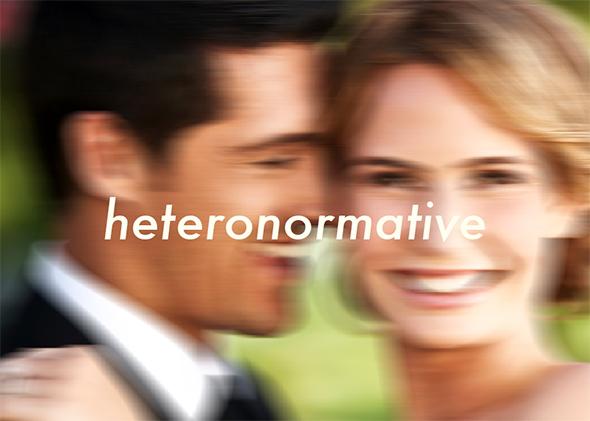You can read about the origins of this series in the first entry. Today, a few more words that may come up when there’s friction between members of the sexual majority and the various minorities.
breeder
A term coined by gays to refer to heteronormative straights. At least a little bit derogatory, though it can sometimes be used affectionately. See also, white-bread (as an adjective), and picket-fencer.
heteronormative
What I hear when a mundane says normal. The dominant cultural script for relationships: completely vanilla, oriented toward forming a traditional married couple in which hubby works and exercises patriarchal authority while wifey keeps house on a cul-de-sac in the suburbs with two and a half kids.
I don’t think anyone has a problem with people choosing a normative relationship, as long as it’s a choice. I get frustrated, though, seeing people trying to pursue this kind of relationship solely because, thanks to fundamentalist parents and a lack of access to real sex education, they have no idea there are other options and know no way to articulate or understand what they really want. So they spend decades feeling miserable and unfulfilled, or end up cheating, or get messily divorced. None of these are great options, especially not once kids are involved.
When people in non-traditional relationships go through a difficult breakup, one of the most painful things to deal with is ignorant friends or family blaming their relationship style for the problem. Nobody blames monogamy or heterosexuality for the 40 to 50 percent divorce rate of monog het marriages, or the far higher rate of monog het couples who break up long before they consider marriage. It seems inevitable that there must be at least some couples out there getting divorced over problems with infidelity who could stay together if they could just decide that their marriage is more important than its monogamy.
mundane, sometimes contracted as ’dane
Unlike vanilla, this is almost always an insult. Mundane originates in the sci-fi/geek community, which overlaps heavily with kink and poly. (You can find lots of essays online speculating as to why that is. My best guess is that if you’re already an outsider—a loser in the relationship and status games played out in high schools all over America—and you have an inclination to tinker and ask questions, you’re much more likely to end up trying out unconventional sex and relationship practices, both out of curiosity and to see if maybe they’ll work better for you.)
A mundane is generally ignorant of non-normative practices and hostile to them when they’re encountered. It’s possible to be not just vanilla, but conservative—to believe, in G.K. Chesterton’s formulation, that you shouldn’t tear down a fence without knowing why it was raised—without being a mundane. The signature of the mundane is the combination of reflexive deference to received tradition with the belief that questioning the authority of such tradition—even asking what the fence was for and whether it’s still useful—is morally wrong and dangerous.
normal
A term often appropriated by mundanes to refer to themselves, in contrast to everyone else, generally based on a willful confusion with majoritarian or normative. Doctors and scientists generally use abnormal only to describe things that are outside the range of a healthy population. I’d be surprised if there are as many philatelists as there are non-monogamists or homosexuals. This in no way makes it abnormal to get a thrill from the dream of finding a Treskilling Yellow for sale by some hapless Swede who doesn’t know what he’s got; it’s merely uncommon.
rubbing my nose in it
Having the unmitigated audacity to exist.
One often hears the complaint, “I’m fine with whatever people want to do, as long as they don’t rub my nose in it.” Strangely, “nose rubbing” appears to extend to things like two men holding hands in public or a married woman remarking that she’s taking her boyfriend out for a birthday dinner. Most of us can see a vanilla couple being mildly affectionate in public without becoming obsessed with the possibility that they sometimes rub their genitals together. Why is it that a gay couple is reduced, in the minds of so many straight people, to what they do in bed? Why does a polyamorist’s date with a secondary seem so much more lurid than a single friend’s date with a new boy- or girlfriend? If you were acquainted with me and my wife, and you would be appalled to run into me and my sweetheart canoodling over dinner at a nice restaurant, but would not be similarly shocked by any other random couple, then I submit that the problem is not my affection for my partners; it’s your double standard. I’m quite private about the details of how my wife and I enjoy each other, but I’m not private about the fact that I have a wife. I’d like it if I never had to pretend any relationship doesn’t exist to protect somebody’s delicate sensibilities.
